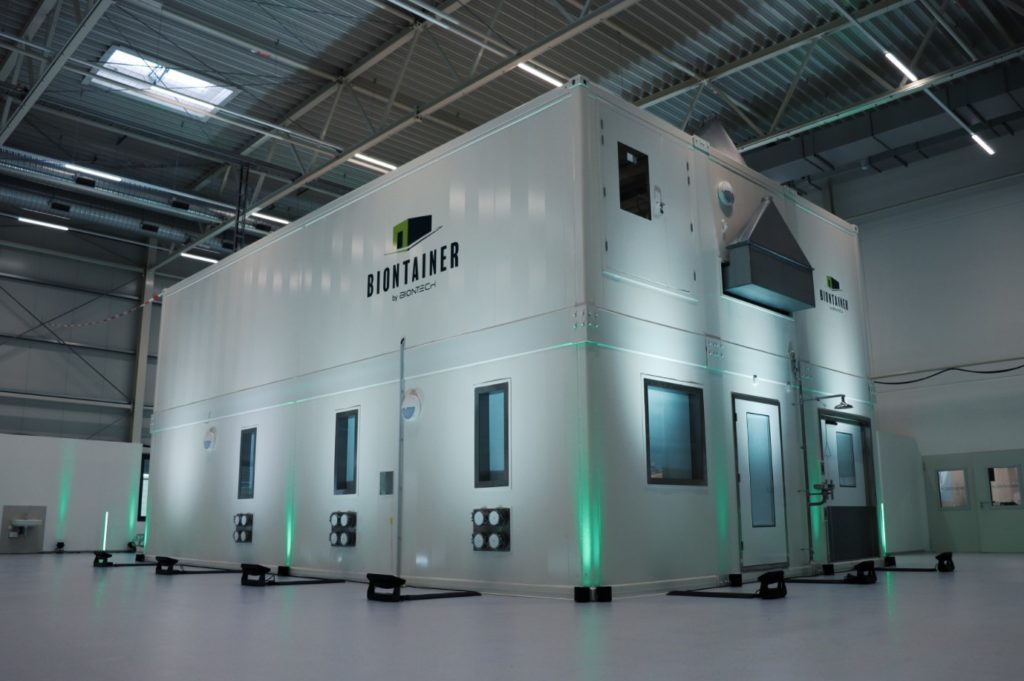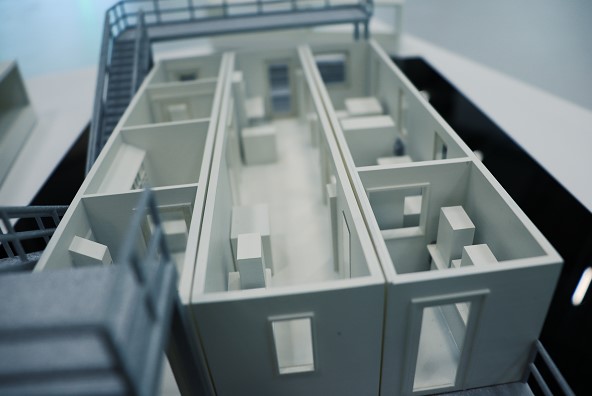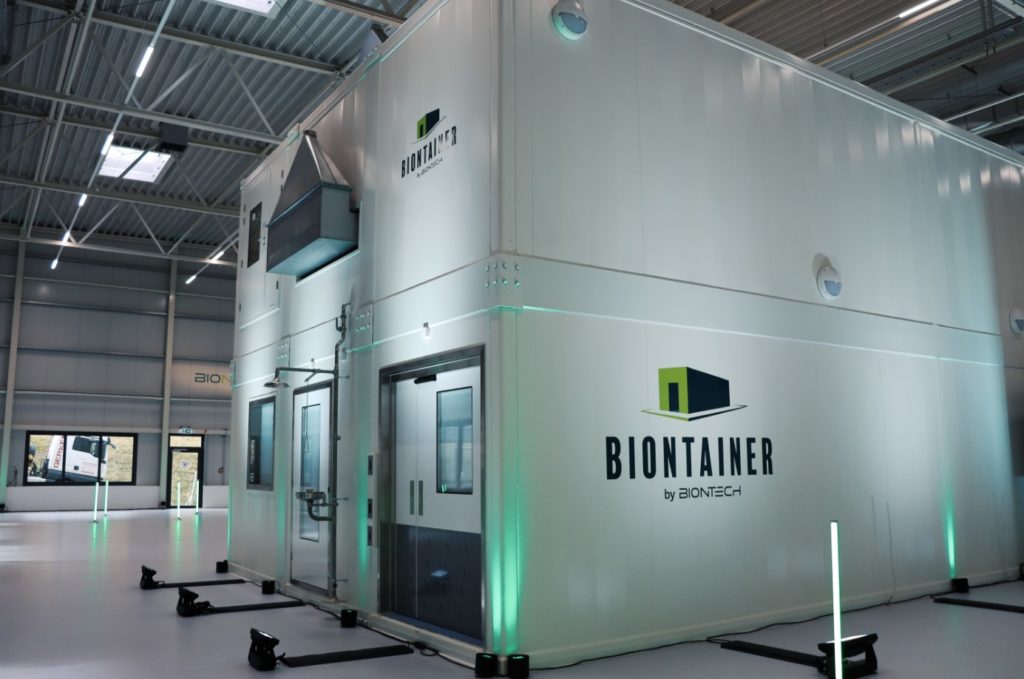BioNTech announced its new vaccine manufacturing approach in Africa where the company will ship modular factories, called the BioNTainer, to the continent to enable domestic production of the vaccines to help increase supplies.
The BioNTainer is housed in shipping containers equipped with state-of-the-art technology for producing the mRNA vaccines from start to finish, except for the final fill-and-finish step that will be performed by local manufacturing partners.
The container solution will consist of the active drug substance and one BioNTainer.
The German company announced the plans at a meeting that took place last week at its new manufacturing facility in Marburg, Germany. The company was invited by the kENUP Foundation, a non-profit public benefit organization that is representing BioNTech, with attendees that included BioNTech’s co-founders Prof. Uğur Şahin, CEO; Prof. Özlem Türeci, CMO; and Sierk Poetting, COO, along with the Presidents of Senegal, Ghana, Rwanda, as well as Tedros Adhanom Ghebreyesus, Director-General of the World Health Organization (WHO) among others.
Related: BioNTech to Build First mRNA Vaccine Production Plant in Africa
BioNTech said the leaders discussed the “infrastructure, regulatory and technological requirements to establish an end-to-end manufacturing network for mRNA-based vaccines in Africa.”
The project is an attempt to help address vaccine inequities that continue to plague the continent.
BioNTech’s BioNTainers have a total footprint of 800 square meters consisting of two modules. Each module contains six standard sized containers, which measure 2.6 m x 2.4 m x 12 m.

Each BioNTainer is a clean room equipped with state-of-the-art manufacturing solutions. The modular factories have an initial capacity of up to approximately 50 million doses of the Pfizer-BioNTech COVID-19 vaccine each year.
“BioNTech’s innovative modular production system opens up a new horizon for global vaccine equity. Rwanda looks forward to initiating mRNA vaccine manufacturing in the near future, in collaboration with BioNTech and our partners in Africa, Europe and beyond,” Paul Kagame, President of the Republic of Rwanda said at the Marburg meeting.
The BioNTainers will not only be equipped to manufacture BioNTech’s COVID-19 vaccine, but also other mRNA vaccines to address the needs in Africa, such as BioNTech’s investigational malaria and tuberculosis vaccines if they reach successful development and approvals.
“COVID-19 might not be relevant in five, six, seven years, but the manufacturing technology will be relevant,” Şahin said on a company call. He said this is because “we know that mRNA is a new drug class, which is suitable for different types of vaccines.”
The capacity of the BioNTainers can be increased with the addition of more modules and sites to the manufacturing network, BioNTech explained in its news release. The company also said that quality control is a crucial aspect of the manufacturing process, which is why it will help to ensure the identity, composition, strength, purity (including the absence of product- and process-related impurities) and absence of microbiological contamination of each batch that is produced.
While BioNTech will deliver and install the modules, local organizations and governments will provide the necessary infrastructure. In support of this, BioNTech revealed a new project in Ghana last week to assist fill-and-finish capabilities.
Poetting explained on a conference call on Wednesday that “On the other hand, we also learned how to run these processes and miniaturize them and make them into modular units.”
The modular approach should be “way cheaper” than building a traditional factory, Poetting said.

The BioNTainers will be shipped to Rwanda, Senegal and possibly South Africa as well in coordination with the respective nations and the African Union. The first BioNTainer-based manufacturing facility in Africa is expected to be established by the middle of this year, and the first manufacturing operations are anticipated to begin a year later.
BioNTech will initially staff and operate the facilities, and gradually transfer the technological know-how to local partners for eventual independent operation. BioNTech said it will work closely with local authorities to ensure compliance with good manufacturing processes (GMP).
Vaccines manufactured in the facilities will be targeted for domestic use as well as export to other African Union member states of the African Union at a not-for-profit price.
BioNTainer Controversy
The BioNTainer is already facing some controversy. Just before the unveiling of the modular container factories, The BMJ medical journal accused BioNTech’s hired consultancy firm the kENUP Foundation of undermining the WHO’s efforts to help companies in Africa make COVID-19 vaccines.
The article in the journal said that The BMJ had accessed documents that show kENUP being critical of the WHO’s mRNA Vaccine Hub for Africa, which is working to help countries in Africa make COVID-19 vaccines. In the documents, keNUP said the venture is “unlikely to be successful and will infringe on patents.” Instead, kENUP was promoting BioNTech’s mRNA container factories in the documents.
In addition to workers, BioNTech has also proposed a new regulatory pathway for the approval of vaccines made in the BioNTainer factories. According to the BMJ article, the novel pathway has been described as “paternalistic and unworkable by some experts, as it seems to bypass local regulators.”
BioNTech had initially announced plans of building an mRNA vaccine production factory in Africa back in October 2021.
Nevertheless, African leaders are welcoming the portable BioNTainer vaccine factories. “Given the emergence and spread of variants, the pandemic will not be over until it is over everywhere. This initiative hopefully expands mRNA vaccine production in Africa,” Michel Sidibé, Africa Union Special Envoy for The Africa Medicine Agency (AMA) said at the meeting.












Join or login to leave a comment
JOIN LOGIN